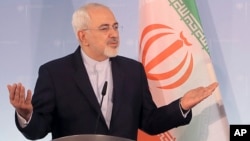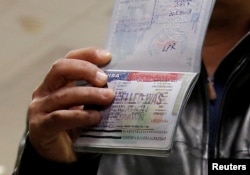Iranian Foreign Minister Mohammad Javad Zarif has denounced the U.S. Supreme Court's partial reinstatement of a travel ban affecting six predominately Muslim countries and said the decision could energize terrorist groups.
"It is regrettable that the citizens of the countries on the list have never participated in any act of terrorism against the U.S. and yet they are being punished for acts of terrorism," Zarif told reporters Tuesday during a visit to Berlin.
Zarif added the reinstatement was the "greatest gift" for terrorist groups seeking new recruits.
In an apparent reference to Saudi Arabia, Zarif said the travel ban punishes people who have never been "involved in terrorism" while citizens of other countries involved in past terrorist acts were not affected.
Osama Bin Laden and 15 of the 19 hijackers involved in the September 11, 2001, al-Qaida attacks on the United States were Saudi nationals.
During a recent visit to Saudi Arabia, President Donald Trump closed arms deals worth nearly $110 billion.
The Supreme Court says it will consider the case of Trump's executive order restricting travel while allowing much of the order to take effect.
Trump’s revised executive order, often referred to as a travel ban, halted entry to the U.S. for people from six mostly Muslim countries for 90 days and the nation’s refugee program for 120 days. The order said these steps were necessary in order to revise security screening to safeguard the nation from external threats.
The travel order had been stayed by two separate federal courts, one in Hawaii and one in Maryland. Both rulings were upheld by separate appeals courts.
US link crucial for travelers
The nation's highest court took a more nuanced view, allowing the ban on travelers from Libya, Iran, Somalia, Sudan, Syria and Yemen and the suspension of the refugee program.
But the justices said the ban on travel cannot be enforced against "foreign nationals who have a credible claim of a bona fide relationship with a person or entity in the United States."
The court goes on to define relationships that would qualify: for individuals, a family relationship; for students; admittance to a college or university; for workers, a job offer.
Trump has said that the travel order would go into effect 72 hours after the high court ruling.
In a statement Monday, he called the Supreme Court decision "a clear victory."
The president added that the ruling helps him protect the homeland. "As president, I cannot allow people into our country who want to do us harm. I want people who can love the United States and all of its citizens, and who will be hardworking and productive."
The justices are expected to hear the travel order case later this year, but noted that they will also consider whether the case will be moot at that point. The measures spelled out in the order are meant to be temporary while the government reviews its security procedures.
Becca Heller, executive director for the International Refugee Assistance Project, said individuals most likely to be affected are those seeking tourist visas from the six countries in question. This is due to their potential inability to prove a relation to the United States that the court’s ruling calls for.
As for refugees, Heller said their clients will largely not be affected and neither should the clients of other resettlement organizations. As of May 31 of this year, 46,403 refugees have been admitted into the United States, near the cap of 50,000 the Trump administration put into place.






